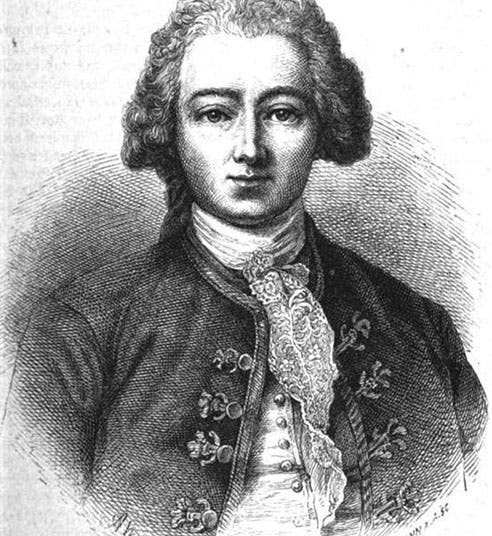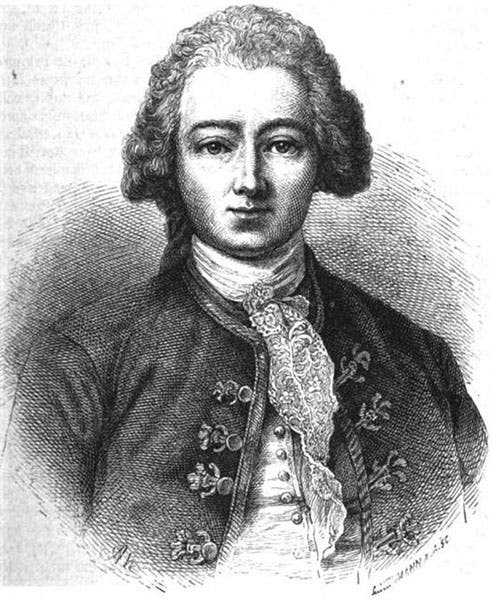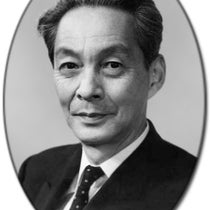Scientist of the Day - Nicolas Chamfort
Nicolas Chamfort, a French writer with an assumed name, was born Apr. 6, 1741, with the name Sébastien-Roch Nicolas. We are working at home these days, as are many of you, and one of the restrictions imposed on us is to limit the number of images to two. With many of our scientists, whose work is visual, that is difficult, so we chose for our subject today a man who needed no images at all to make his point. Chamfort was an aphorist, a coiner of maxims, a profession that is unfortunately missing from the modern world. So witty and worldly-wise was he that he was kept by numerous courts, patrons, and women, solely for his conversation. Fortunately for those of us out of the social loop, many of his epigrams were later committed to print and published. Chamfort had lots to say about students of nature (he liked them) and students of ethics and society (these he did not like so much). We collect together here a few of my favorite Chamfort sayings, some that pertain to science and natural philosophy, and some that do not, noting that my copy of his Maxims and Aphorisms sits in my office at the Library, unavailable to me, so I work from what I hope are trusty notes.
Six aphorisms of Nicolas Chamfort:
- An economist is a surgeon with an excellent scalpel and a rough-edged lancet, who operates beautifully on the dead and tortures the living.
- The physical world appears the work of a good and mighty Being who has had to abandon the execution of part of his plan to a maleficent Being. But the moral world seems rather the production of a crazy fiend’s caprices.
- Said a witty misanthrope to me à propos of the iniquities of men, “It is only the uselessness of the first Deluge that preserves us from being visited by a second.”
- I would say of metaphysicians what Scaliger said of the Basques: they are supposed to understand each other, but I do not believe it.
- Dogma is like a bitter pill: if you chew it, you will never be able to swallow it.
- Conscience is a dog that does not stop us from passing but that we cannot prevent from barking.
I think I would have liked this man, and would have enjoyed talking with him over a cup of coffee, preferably with a philosopher of science also at the table to absorb the blows, but I probably wouldn’t have wanted to take him home to meet my parents, my girlfriend, or my minister.
Unfortunately, Chamfort got caught up in the excitement of the French Revolution, ran afoul of the Jacobins, and was imprisoned. He was eventually released, but when threatened with imprisonment for a second time, he attempted suicide, first with a pistol to the head, and when that failed, with a knife to his throat. Unfortunately, his pen was far mightier than his sword or his gun, for it took him seven excruciating months to die. He deserved better.
Authentic portraits of Chamfort are hard to come by. The one most often reproduced, on Wikipedia, and on the covers of some modern editions of his Maxims, does not seem to have any valid pedigree. There is another that is buried deeper in Wikimedia commons, and this one carries a citation, to an 1870 issue of a reputable 19th-century German journal, Westermanns Monatshefte, so we went with this one (first image). If there is an oil portrait anywhere, we were unable to find any trace of it.
Since we are allowed a second image, we choose the plaque affixed to the house in Paris, at 10, rue Chabanais, where Chamfort died. The inscription says: “In this house, Chamfort, born in 1741, took his own life on April 13, 1794.”
Dr. William B. Ashworth, Jr., Consultant for the History of Science, Linda Hall Library and Associate Professor emeritus, Department of History, University of Missouri-Kansas City. Comments or corrections are welcome; please direct to ashworthw@umkc.edu.








